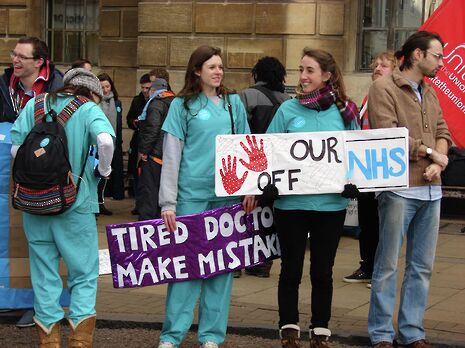Cambridge junior doctors strike again as Hunt imposes contracts
Protesters took to Cambridge’s Market Square on Wednesday in support of junior doctors

Health Secretary Jeremy Hunt imposed a controversial new contract on junior doctors on Thursday, following a second 24-hour strike by health professionals on Wednesday which resulted in almost 3,000 operations being cancelled.
In Cambridge, approximately 200 junior doctors, supporters and activists gathered outside Addenbrooke’s Hospital for a rally protesting against new contracts for junior doctors which aim to extend NHS provision on Saturdays and Sundays to create a “seven-day NHS”.
Addenbrooke’s stated that the day-long walkout, which began at 8am, resulted in 10 per cent of operations and 10 per cent of outpatient appointments being cancelled. This is the second strike by the British Medical Association (BMA) over the course of this ongoing row with the government about the terms of the new contracts.
Speaking to Varsity, one junior doctor stated that there were “three main points” to their protest. The first related to “patient safety”, accusing “the government [of] essentially trying to have the same amount [sic] of doctors work longer hours and more shifts, which will leave gaps in the week”.
The second reason given related to the Health Secretary’s “analogy” between “the airline safety and their patient safety record”. The junior doctor stated that the reality of “what [the government is] trying to impose on the NHS as a whole, and not just junior doctors and their contracts, is that you have more people flying planes, but shutting the airports and the airport staff and the runways, and packing the planes with more people who are increasingly more complex with little fuel, and all it’s going to result in is doctors crashing more planes and patients dying as a result or suffering in the long-run.”
The third related to public support, with the junior doctor urging people to “speak up and support their own NHS if they still believe in it.”
On Thursday in the House of Commons, Jeremy Hunt told MPs that he had decided to impose the new contract after the BMA had rejected the “best and final offer” proposed by the Health Secretary as a compromise.
In his statement before the Commons, Hunt confirmed his intention to act on his longstanding threat after negotiations with the BMA broke down.
In particular, he asserted that the BMA’s refusal to negotiate on the key issue of whether Saturday should form part of a junior doctor’s ordinary working week. Hunt accused the union of inflexibility on the issue, which he stated was vital in achieving a seven-day NHS by 2020, one of the government’s key manifesto pledges.
In Market Square in the centre of Cambridge, protestors also gathered on Wednesday to condemn the government’s actions in the negotiations and the course it was pursuing.
There was a large ‘NHS petition’ printed on a continuous sheet of A1 paper and ‘Jeremy Hunt Free-zone’ cards, which people signed and kept in their wallets as a declaration that they did not want the Health Secretary to visit them in hospital.
 News / Fitz students face ‘massive invasion of privacy’ over messy rooms23 April 2024
News / Fitz students face ‘massive invasion of privacy’ over messy rooms23 April 2024 News / Climate activists smash windows of Cambridge Energy Institute22 April 2024
News / Climate activists smash windows of Cambridge Energy Institute22 April 2024 News / Copycat don caught again19 April 2024
News / Copycat don caught again19 April 2024 News / Emmanuel College cuts ties with ‘race-realist’ fellow19 April 2024
News / Emmanuel College cuts ties with ‘race-realist’ fellow19 April 2024 Comment / Does Lucy Cavendish need a billionaire bailout?22 April 2024
Comment / Does Lucy Cavendish need a billionaire bailout?22 April 2024






